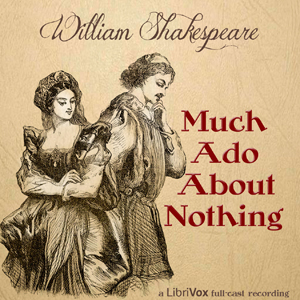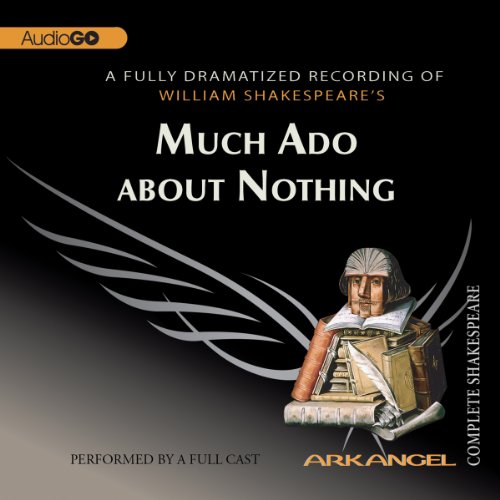William Shakespeare’s “Much Ado About Nothing” audiobook brings this classic comedy to life. The story explores love, deception, and witty banter.
“Much Ado About Nothing” is one of Shakespeare’s most celebrated comedies. The play revolves around two couples, Claudio and Hero, and Beatrice and Benedick. Claudio and Hero’s romance faces obstacles due to deceit, while Beatrice and Benedick engage in a battle of wits.
The audiobook version captures the humor and drama, making it accessible for modern listeners. Shakespeare’s clever dialogue and timeless themes resonate deeply. This audiobook is perfect for fans of classic literature and those new to Shakespeare’s work. Enjoy the lively performances and immerse yourself in the Elizabethan era.
Introduction To ‘much Ado About Nothing’
William Shakespeare’s ‘Much Ado About Nothing’ is a delightful comedy. It revolves around love, deception, and misunderstandings. This play remains a timeless favorite for audiences.
Listening to the audiobook brings a unique experience. You can hear the characters come to life. It adds depth to the witty exchanges and dramatic scenes.
Setting The Stage
‘Much Ado About Nothing’ is set in Messina, a quaint Italian town. The story unfolds in the governor’s house and lush gardens. This setting adds charm to the romantic and comedic elements.
The characters include the witty Beatrice and Benedick. They engage in spirited banter and disguise their true feelings. Claudio and Hero represent young, idealistic love. Their story faces trials but ends happily.
Key Themes And Symbols
The play explores several themes and symbols. Here are a few key ones:
| Theme | Description |
|---|---|
| Love and Deception | Characters deceive each other, often with good intentions. This leads to humor and drama. |
| Honor | Honor is a critical theme. Misunderstandings about honor create conflict and resolution. |
| Gender Roles | The play challenges traditional gender roles. Beatrice is a strong, independent woman. |
Symbols also play a vital role in the story:
- Masks and Disguises: Characters use masks to hide their true selves.
- Music: It symbolizes harmony and discord in relationships.
- Garden: The garden setting represents growth and natural beauty.
Meet The Characters
William Shakespeare’s Much Ado About Nothing is a delightful comedy. In this audiobook, you will meet some unforgettable characters. Their stories are full of wit, love, and surprises.
Beatrice And Benedick: A Witty War
Beatrice and Benedick are the stars of the play. They share a unique relationship full of clever banter. Their conversations are sharp and funny.
- Beatrice is witty and strong-willed.
- Benedick is a confirmed bachelor who loves to argue.
They enjoy teasing each other. Their friends plot to bring them together. Listening to their verbal duels is a delight in the audiobook.
Claudio And Hero: Love And Deception
Claudio and Hero represent young love in the play. Their relationship faces many trials. They fall in love quickly but are tested by lies and tricks.
- Claudio is a young soldier, brave but naive.
- Hero is gentle and innocent.
Their love story is full of misunderstandings. Listening to their journey in the audiobook brings their emotions to life.
Critical Analysis
William Shakespeare’s Much Ado About Nothing is a timeless comedy. The play explores complex themes, making it a rich subject for critical analysis. This section delves into two key aspects: gender roles and the power of language. These elements are crucial to understanding the play’s depth and significance.
Exploring Gender Roles
In Much Ado About Nothing, gender roles are prominent. The play portrays a clear distinction between male and female characters. Men are often depicted as warriors and leaders. Women are shown as passive and submissive. Yet, Shakespeare challenges these stereotypes through characters like Beatrice and Hero.
Beatrice is outspoken and witty. She does not conform to traditional gender roles. She speaks her mind and often challenges male authority. Hero, on the other hand, represents the ideal woman of that era. She is obedient and modest. Their contrasting personalities highlight the gender expectations of the time.
Gender roles in the play also affect the plot. The misunderstandings and conflicts often stem from gender-based assumptions. For instance, Claudio’s quickness to believe in Hero’s infidelity reflects societal views on female virtue. The resolution of these conflicts often involves re-establishing traditional gender norms.
The Power Of Language
Language in Much Ado About Nothing is a powerful tool. Characters use it to manipulate, deceive, and express love. Benedick and Beatrice’s witty banter is a central element. Their wordplay not only entertains but also reveals their intelligence and compatibility.
Deception through language is another critical theme. Don John uses lies to create chaos. He deceives Claudio and Don Pedro, leading to Hero’s public shaming. The play shows how language can harm and heal. The truth eventually comes to light, restoring order and happiness.
The use of eavesdropping and misunderstandings highlights the importance of communication. Many conflicts arise from overheard conversations or misinterpreted words. This theme emphasizes the need for clear and honest communication in relationships.
| Character | Role | Language Use |
|---|---|---|
| Beatrice | Outspoken, witty | Challenges gender norms |
| Hero | Obedient, modest | Reflects societal expectations |
| Benedick | Witty, intelligent | Uses wordplay |
| Don John | Deceptive, malicious | Manipulates through lies |

Behind The Scenes
Listening to the Much Ado About Nothing audiobook brings Shakespeare’s classic play to life. Have you ever wondered what inspired Shakespeare or the historical context of the play? Let’s dive into the behind-the-scenes details.
Shakespeare’s Inspiration
William Shakespeare found inspiration in various sources for his plays. For Much Ado About Nothing, he drew from Italian literature. One key source was Ludovico Ariosto’s “Orlando Furioso.” This epic poem featured themes of love and deception.
Another influence was Matteo Bandello’s “Novelle.” Bandello’s stories often dealt with romantic entanglements. These tales gave Shakespeare ideas for character relationships and plot twists.
Shakespeare also observed human behavior around him. He noticed how people handled misunderstandings and emotions. This real-life observation helped him craft believable and relatable characters.
Historical Context
The historical context of Much Ado About Nothing is vital to understanding the play. Shakespeare wrote it in the late 16th century. At this time, England was under the rule of Queen Elizabeth I. The era was known for its strict social norms and gender roles.
During the Elizabethan era, marriage was a key social institution. It was often arranged for social and economic reasons. Love and romance were secondary considerations. This context is reflected in the play’s plot and character motivations.
The setting of the play is in Messina, Sicily. This location was chosen to give the story an exotic feel. It also allowed Shakespeare to explore different societal norms and practices.
Understanding these historical details enhances the listening experience of the audiobook. It provides depth to the characters and their actions.
| Source | Influence |
|---|---|
| Ludovico Ariosto’s “Orlando Furioso” | Themes of love and deception |
| Matteo Bandello’s “Novelle” | Romantic entanglements |
By understanding the inspirations and historical context, listeners can appreciate the depth of Much Ado About Nothing. The audiobook brings these elements to life, making Shakespeare’s work accessible and enjoyable.
Adaptations Through The Ages
William Shakespeare’s Much Ado About Nothing has seen countless adaptations. Its timeless themes and witty dialogue make it a favorite. This section explores the play’s adaptations through the ages.
Stage And Screen
Many directors have brought Much Ado About Nothing to life on stage and screen. Each adaptation offers a unique take on Shakespeare’s work.
- Stage Productions: The play has been performed in various styles, from traditional Elizabethan to modern-day settings.
- Film Versions: Notable films include Kenneth Branagh’s 1993 version and Joss Whedon’s 2012 adaptation.
These adaptations keep the story fresh and exciting for new audiences.
Modern Interpretations
Modern interpretations often set the play in contemporary times. They adapt the language and setting while keeping the original plot.
- Television: Some TV shows have reimagined the story in different genres.
- Online Platforms: Digital adaptations have made the play accessible to a global audience.
These modern takes help younger audiences connect with the classic story.
Whether on stage, screen, or online, Much Ado About Nothing continues to inspire. Its adaptability ensures it remains relevant through the ages.

Creating The Audiobook
The process of creating an audiobook for William Shakespeare’s “Much Ado About Nothing” involves several steps. This includes selecting the perfect voice actors and bringing each character to life. These steps ensure the story remains engaging and authentic.
Voice Casting Choices
Choosing the right voices is crucial for the audiobook’s success. Each character needs a unique voice to stand out. The casting team often looks for actors with experience in classical literature. They want those who can capture the essence of Shakespeare’s language.
Here are some qualities they consider:
- Clarity: The actor’s voice should be clear and easy to understand.
- Emotion: The actor must convey emotions effectively.
- Consistency: The voice should remain consistent throughout the audiobook.
Bringing The Characters To Life
Each character in “Much Ado About Nothing” has a distinct personality. The voice actors work hard to bring these personalities to life. They use tone, pitch, and pacing to reflect the characters’ traits.
For example:
| Character | Voice Qualities |
|---|---|
| Beatrice | Witty, sharp, and lively |
| Benedick | Confident, humorous, and bold |
| Don John | Menacing, deep, and sinister |
The actors also consider the historical context. They strive to maintain the integrity of Shakespeare’s original work. This makes the audiobook both educational and entertaining.
Sound effects and background music are also important. They add depth to the listening experience. These elements help set the scene and mood, making the story more immersive.
Why Listen To ‘much Ado About Nothing’
Listening to ‘Much Ado About Nothing’ offers a unique experience. The play’s humor and wit come alive. You can enjoy Shakespeare in a fresh way.
The Benefits Of Audiobooks
Audiobooks are great for multitasking. You can listen while you cook or clean. They make reading more accessible. People with visual impairments benefit greatly. Audiobooks also help improve listening skills.
- Convenience: Listen anytime, anywhere.
- Accessibility: Great for people with visual impairments.
- Multitasking: Enjoy stories while doing chores.
Experiencing Shakespeare Audibly
Shakespeare’s plays are meant to be heard. Listening captures the rhythm and sound of his language. Actors bring characters to life with their voices. You can hear the emotion in every line. This makes the experience more immersive.
The comedy in ‘Much Ado About Nothing’ shines through in an audiobook. Jokes and wordplay become clearer. The lively dialogue keeps you entertained. You get to hear Shakespeare as it was intended: a performance.
| Benefits | Description |
|---|---|
| Engagement | Actors’ voices make characters vivid. |
| Emotion | Hear the feelings in every line. |
| Comedy | Jokes and puns are easier to understand. |
Listening to ‘Much Ado About Nothing’ brings Shakespeare’s world to your ears. It turns a classic play into an enjoyable, modern experience.

Conclusion
Dive into the enchanting world of “Much Ado About Nothing” with this audiobook. Shakespeare’s timeless comedy promises laughter and intrigue. Enjoy the rich characters and witty dialogue. Perfect for both new listeners and seasoned fans. Experience the magic of Shakespeare’s work in an engaging audio format today.



